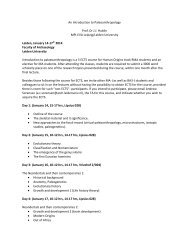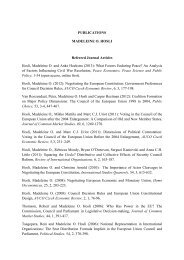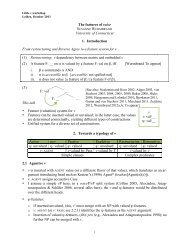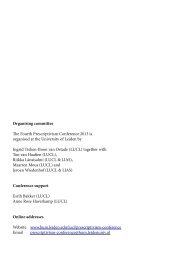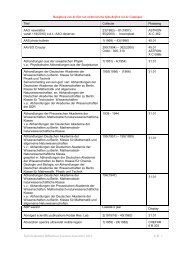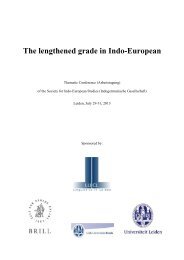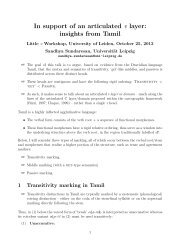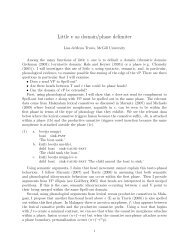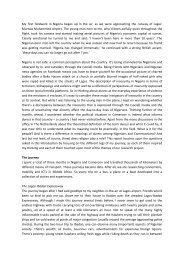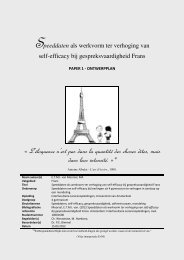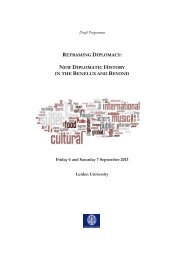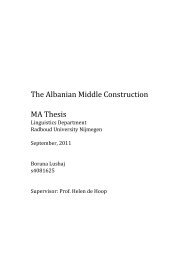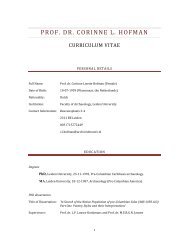Institute for History Annual Report 2010 - O - Universiteit Leiden
Institute for History Annual Report 2010 - O - Universiteit Leiden
Institute for History Annual Report 2010 - O - Universiteit Leiden
You also want an ePaper? Increase the reach of your titles
YUMPU automatically turns print PDFs into web optimized ePapers that Google loves.
Migration, settlement processes of migrants and<br />
the <strong>for</strong>mation of minorities (and discrimination)<br />
are mostly studied in an urban context. For this<br />
reason, this research theme focuses on the city as a<br />
framework <strong>for</strong> research. Urban environments can<br />
be seen as a laboratory, in which processes of<br />
migration, integration and <strong>for</strong>mation of minorities<br />
take place. Depending on the specific research<br />
question, social processes can be studied with the<br />
city as the ‘site’ or explicitly be linked to the<br />
demographic, physical, spatial and political<br />
opportunity structure of specific cities. Two<br />
concrete projects should be mentioned: one is the<br />
diachronic analysis of demographic changes in<br />
pre-war and post-war The Hague, when both<br />
Dutch and <strong>for</strong>eign migrations repeatedly and<br />
significantly changed the character of the city. The<br />
central question in this project is the extent to<br />
which the diminished social cohesion of the last<br />
decades of the 20th century should be viewed as a<br />
new phenomenon. The second project looks into<br />
the development of civil services in the Netherlands<br />
by focusing on the area of tension between<br />
citizens, church and government. In this way we<br />
aim to discover the nature of the interaction that<br />
existed between the civil initiatives undertaken by<br />
the government, citizens and churches in the<br />
transition from private to public. This research<br />
focuses on the period between 1500 en 1800 when<br />
citizenship moved from town to nation and the<br />
effects of bureaucratisation on the ideal of<br />
citizenship and the involvement of citizens in civil<br />
services.<br />
<strong>Institute</strong> <strong>for</strong> <strong>History</strong><br />
112<br />
State <strong>for</strong>mation and frontiers<br />
The term globalisation refers primarily to an<br />
increase in the exchange of goods, persons and<br />
ideas between various parts of the World. Borders,<br />
at local, national and supra-national level, play a<br />
vital role. In the Early Modern period the<br />
boundaries of cities were often more important<br />
than national borders. In the modern period national<br />
borders have not proved to be very stable.<br />
Numerous new states emerged and the borders<br />
between states changed constantly. Moreover,<br />
changes of regimes, <strong>for</strong> example as the result of<br />
decolonisation have given new meaning to existing<br />
boundaries. In the case of the EU national<br />
borders have lost salience to some extent, which in<br />
turn influenced the mobility of people, capital,<br />
goods and ideas, as well as the status of citizenship.<br />
Political economy, networks and the<br />
economic role of institutions The distribution of<br />
incomes, means of production and legislations<br />
changed dramatically since the 16th century and<br />
even more so in the 19th and 20th centuries,<br />
leading to an increasing intensity, velocity and<br />
impact of the globalisation process. These<br />
developments are related to the consumption<br />
revolution, which started already in the 18th<br />
century, involving trade networks, industrialisation,<br />
decolonisation, and more recently the<br />
European unification. Closely related are the<br />
changes in labour relations and the competition<br />
between various economies on a world scale.<br />
Specific attention is given to institutions through<br />
which people build their networks and social<br />
capital. Instead of juxtaposing the Early Modern




